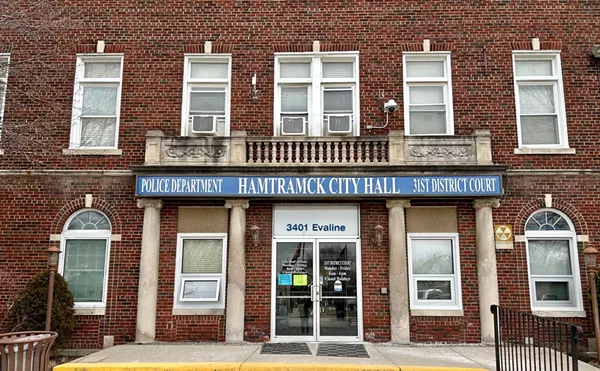
Audio By Carbonatix
[
{
"name": "GPT - Leaderboard - Inline - Content",
"component": "35519556",
"insertPoint": "5th",
"startingPoint": "3",
"requiredCountToDisplay": "3",
"maxInsertions": 100,
"adList": [
{
"adPreset": "LeaderboardInline"
}
]
}
]
special-rights ordinances for homosexual behavior.”
Perhaps he’s too humble.
The purpose of his interview with CitizenLink — an organization self-described as dedicated to inspiring men and women to live out a biblical citizenship that transforms culture — was to discuss a state bill he introduced in October (HB 5039).
If passed, the bill would forbid local units of government from enacting laws protecting groups not already covered in the state’s Elliott-Larsen Civil Rights Act of 1976 from discriminatory practices and policies. Notably, the act doesn’t protect people from discrimination based on sexual orientation or gender identity.
What McMillin wants to make sure is that no state agency or unit of local government can provide that protection.
According to Equality Michigan, as of July 2011, 15 cities in the state have ordinances that protect at least one of those two exempted groups.
“Under 5039, the municipalities have to abide by what the state calls a protected class,” McMillin told CitizenLink. “This merely says the debate should be at the state level. We can’t have a patchwork of protected classes [that means] depending on which side of the street you live on, businesses have to operate differently.”
In other words, McMillin says he’s just trying to ensure consistency between state and local laws.
McMillin’s record shows he’s been active for many years in trying to block what he calls “special rights” ordinances.
In 2000, as treasurer of the Oakland County Residents for Equal Rights Not Special Rights, he was heavily involved in bringing down Ferndale’s LGBT-inclusive human rights ordinance, according to Between the Lines. When Royal Oak was poised to adopt similar measures soon after, McMillin and his group successfully shot that down as well.
In September 2003, as an Oakland County commissioner, he successfully pushed for a resolution in support of amending the state Constitution to ban same-sex marriages. The amendment was passed in 2004 with 59 percent of the vote, and, after a lengthy court battle, was upheld by the state Supreme Court in 2008.
But according to Section 22 of the Michigan Constitution, municipalities have the power to adopt resolutions and ordinances that pertain to local concerns, property and government, subject to the Constitution and law.
Jay Kaplan, a staff attorney for the Michigan ALCU’s LGBT project, told Between the Lines that these local powers include the authority to pass civil rights ordinances (as cities already have done) to provide more comprehensive protection that includes categories not enumerated in Michigan’s existing civil rights laws.
In layman’s terms: If McMillin’s bill is passed, there will likely be lawsuits in response.
The controversy over HB 5039 comes on the heels of the controversial domestic partner benefits bans that Gov. Rick Snyder signed into law last month.
Those particular bills (HB 4070/HB 4071) were introduced with the claimed intention of saving the state about $8 million a year.
For Snyder, a business leader and fiscal conservative from socially progressive Ann Arbor, these laws seem much more reactionary than the narrow economic issues he championed in his gubernatorial run.
In fact, Ann Arbor’s city council passed a resolution in September urging Snyder not to sign the two laws.
According to the Ann Arbor Chronicle, state Rep. Jeff Irwin, a Democrat who represents most of Ann Arbor, argued on the House floor against the bills, saying, “If this becomes law, we will have two employees working side by side with the same qualifications and experience, and the employee living in a traditional family will receive significantly greater compensation. That is clearly unfair and discriminatory.”
Cities including Lansing, East Lansing, Ferndale and Kalamazoo (all of which have more inclusive local human rights ordinances) have passed resolutions opposing HB 5309.
McMillin told CitizenLink, “[City commissions say] we’re taking away their rights, but they’re required to abide by all kinds of laws at the state level that they can’t change. This is just pointing out the need for one more.”
But McMillin is a modest sort. Instead of gleefully chortling over the possibility of rolling back local civil rights ordinances with his end run at the statehouse, McMillin says he’s just fighting to end oppressive ordinances that are “often used to discriminate against Christians.”
For instance, he told the Michigan Messenger, local protections are already violating the rights of the Boy Scouts in Detroit, a Christian-owned printing business in Ypsilanti, and Christian-owned coffee shops in the Traverse City area.
So you see, as the Lord’s meek-hearted servant, McMillin is determined to defend those poor, victimized Christians — in majority-Christian Michigan — even if it just happens to mean forbidding any unit of government for standing up for gays and lesbians in the process.
How blessed are the humble.






